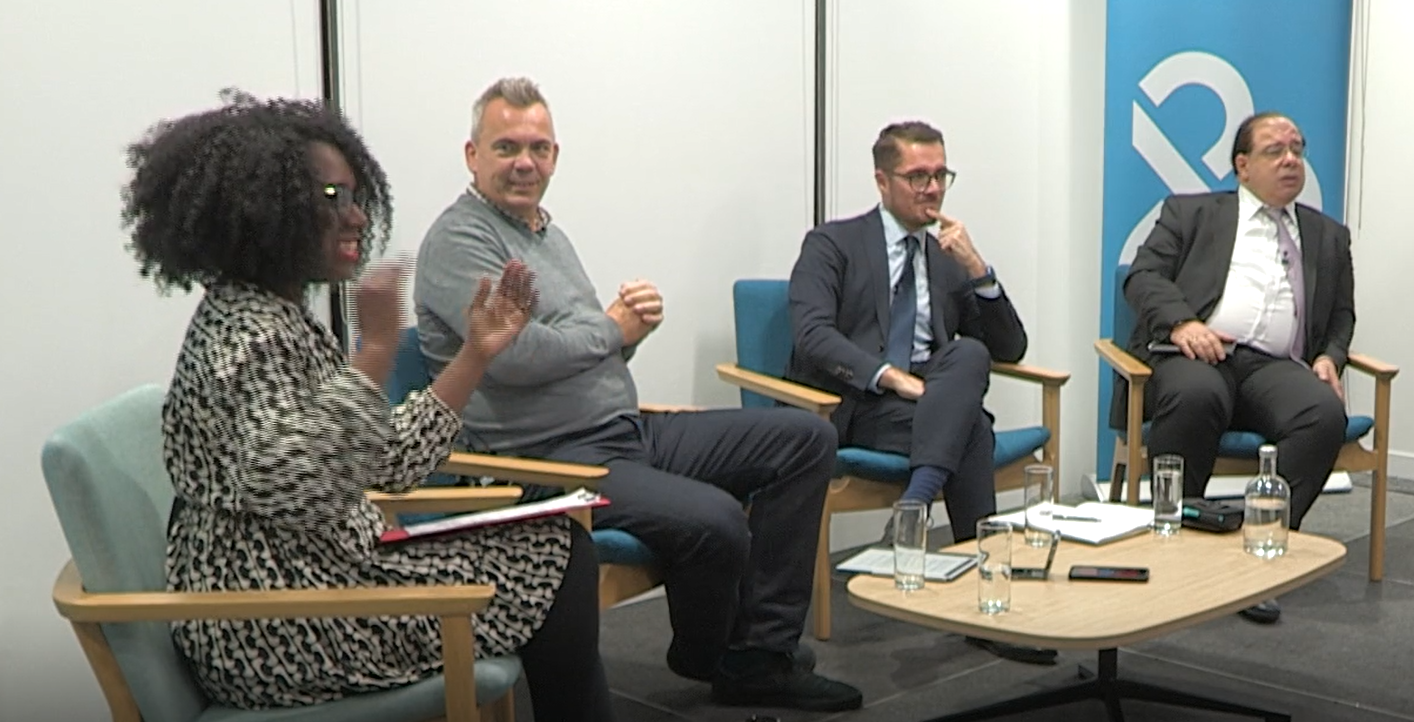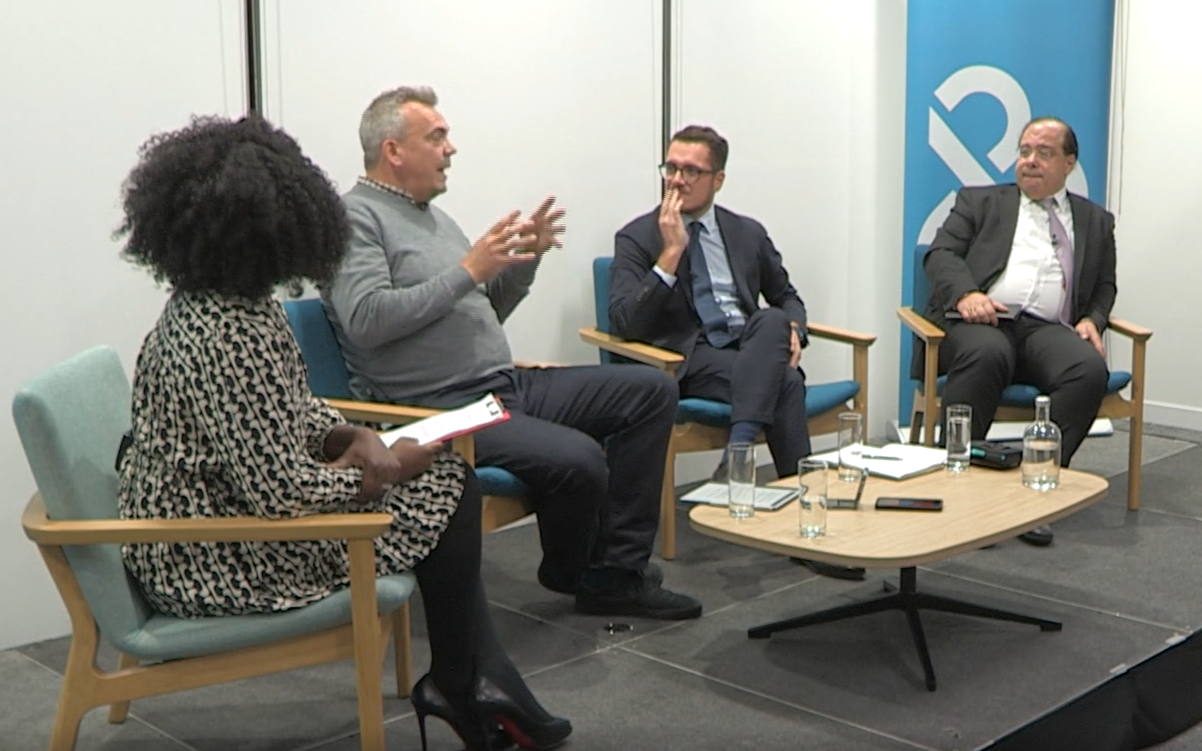Our resilience has been tested in recent years – both professionally and personally. From Brexit to the pandemic, political uncertainty to a new monarch, we’ve experienced one challenge after another.
During a panel session hosted by Dr Louise Maynard-Atem, Women in Data Champion, we heard about the impact of recent macroeconomic changes on supply chains, business finance and sales with Dr. Anthony Scriffignano, SVP and Chief Data Scientist, Tommaso Aquilante, Associate Director of Economic Research (both Dun & Bradstreet), and Steve Kemish, CEO of IMG.

The panel discussed the future of businesses and the results of Dun & Bradstreet’s new report on the use of data to drive resilience. The conversation ranged from data and AI to helping employees thrive in a turbulent, unpredictable environment. Key takeaways include:
1. Resilience: what is it, and can it be learned or measured?
For Tommaso, there’s a clear distinction between resilience and robustness, with resilience being the ability to adapt to shock and bounce back while robustness is the ability to resist impact. And talent is fundamental to an organisation’s ability to be both.
As a student of martial arts, Anthony described resiliency as the ability to get back up, but in a way that allows you to move forward – even though you might not have necessarily recovered fully. Resilience means responding to a situation in a way that might not be ideal, but it’s about having the willingness to move and try something different.
Measuring resilience is no easy task. But for Anthony, when analysing data from established, long-lived organisations, resiliency was most clearly demonstrated by the ability to reinvent – to do or try something different in the face of disruption or adversity.
Carrying this line of thought forward, Steve shared that at the heart of resilience is community – it’s a team sport to be truly resilient, not a solo pursuit. But, unlike sports, it can’t be taught.
To his mind, no one ever calms down by being told to calm down and being told to be resilient too is not enough. Forging resilience is cultural within organisations and it requires managers to understand why their employees work, why they do what they do and what makes them tick. Rather than one person leading, it’s about facing change together.
2. UK market challenges: what’s the impact to business resilience?
Following on from the panel’s definitions of resilience, Louise asked everyone to dig deeper into the current economic climate and discuss how this situation is impacting businesses today.
Tommaso started by highlighting the fiscal support and monetary policy easing that was seen during the pandemic – a response he believed was unmatched and spoke to the drastic situation we were all facing.
“Unprecedented. This is a word we heard many times during the pandemic and in this case, I think it’s appropriate.” – Tommaso Aquilante
The first lesson we learned from the pandemic is how unpredictable its impact on the economy has been, Tommaso explained. We’re now facing higher inflation for much longer than anticipated. And, of course, Europe’s dependence on Russia from a trade and energy perspective has continued to affect inflation.
As a result, Tommaso said, the disruption to supply chains has been persistent. Businesses need to understand what to optimise within their supply chains, and how they want to optimise it, to abate the disruption. Is it reducing the unit cost of goods in your inventory? Or are you preparing to allow for a buffer in your supply chain?
The second lesson, for both Tommaso and Anthony, was the magnitude of the skills gap in some sectors in the UK. Finding people with the right skills was a struggle before Covid, but, for Tommaso, the pandemic exacerbated the situation. And during Covid, employees had an opportunity to take control of their work life balance which for some this meant finding a new career altogether – something we’re still seeing this play out in today’s job market.
And thirdly, Tommaso highlighted that businesses have now realised the potential to use advanced analytics to optimise their supply chain. This isn’t a new thing. But rather, disruptions to the market often highlight areas for improvement, shining a light for many businesses on the need to rapidly improve supply chain operations.
But despite economic uncertainty, resiliency isn’t the largest concern for businesses -according to Anthony who shared new insight from Dun & Bradstreet’s soon-to-be-released research. Energy prices are the top worry for UK businesses at present, while the cost of living and weakening consumer demand go hand-in-hand as companies start to feel the impact of customers tightening their belts.
Similarly, using data to understand fraud and disruption was one of the lowest priorities on the survey. This was surprising for Anthony who noted that, when an organisation is focused on responding to market disruptions is also when they are most distracted – a prime opportunity for cybercriminals to take advantage.
As recession looms, having the right data to understand where a business can cut back or find opportunities to grow – for example, in a different market that’s not seeing the same stagnation in growth – will be critical.
3. Adapting to changing customer demands: how does this impact sales and marketing?
Louise shone a spotlight on the fact that, during difficult times, a customer’s need for a product or service often diminishes. So, for businesses looking to protect the bottom line, Louise asked what the impact is typically on marketing and sales during a less-favourable economic climate.
In response, Steve highlighted that while we’re in an inevitable downturn following the shock of the pandemic, there are still opportunities for organisations.
“Growth doesn’t always come from getting more, it might be doing more with what you’ve got, or even less. And that could be resource, it could be technology, it could be all the costs of your organisation.” – Steve Kemish
Growth can come from a variety of places. From transformation or data-driven activity, not just marketing. For Steve, it’s using data to get the right audience insight to understand where you put the lens of sales and marketing activity that really makes an impact.
Organisations that are willing to look beyond their current market, to new sectors or geographies, will be in a better position to capitalise on opportunities when the economic climate isn’t favourable. To achieve this, businesses need to be adaptable, Steve explained. This means having the data and tools to really understand where the opportunity lies, what you need to get there, and how you’re going to approach that market.
And when you’re facing a reduced consumer pool with the same number of competitors – perhaps offering a very similar product to you – marketing has the potential to say: how do we talk differently? How can we resonate and what makes us relevant? Armed with data-backed insight into potential market opportunities is where real growth can be harnessed.
For all three panellists, at the core of resiliency during a crisis – be it a recession, pandemic, or political turmoil – is adaptability. In the event of any disruption, changing how an organisation operates can seem daunting. Whether it’s how you’re advertising, who you’re selling to, or even the way in which you run your supply chain. But having the ability to evolve how you do things, and learning by doing, is essential to weathering a crisis.
4. Rebounding from shock: how can data and technology help with setbacks?
Louise posed the question as to how organisations can improve the use of their data and technology to better come out of difficult situations or major shocks.
For Steve, it’s about making more of what you’ve got. With the current skills gap in the UK colliding with unemployment numbers that are expected to rise, businesses are in a tricky situation where budgets might not allow them to easily find and plug in more people. Here, organisations – often awash with digital tools and solutions already in place – could find themselves needing to get the most from existing technologies. People, processes and data will be paramount for organisations as we move into next year. But, in Steve’s mind, it’s not just about having data. It’s about the pairing of good data with rich analysis, which provides nuances that allow you to change direction and reach audiences you might have otherwise missed.
In agreement with Steve, Anthony, referred to the epistemology of data. If you look for what’s the same, you won’t see what’s different and vice versa. However, for Anthony, technology is only as good as the minds of those taught to use it. And for this reason, he believes Artificial Intelligence (AI) and Machine Learning (ML) aren’t the answer to resilience.
“We have to be very careful we don’t just push the AI button because it will rapidly deliver an answer, it may accelerate the speed with which you hit the wall.” – Anthony Scriffignano
AI, for Anthony, is in its adolescence. It must be supervised and requires considerable human input to produce meaningful, usable insight. But an area in which it can support businesses today is the ability to process information at scale and speed, according to Steve.
For example, screening customers or suppliers for red flags such as insolvency risk, financial crime, sanctions etc, or understanding when to send a marketing campaign based on previous open-rates or engagement levels. In Steve’s experience, from a sales and marketing point of view, AI can quickly facilitate when is typically the best time to reach audiences, and this ability to talk to consumers – meeting them how and where they want to be met – is invaluable when it comes to market differentiation during a crisis or economic downturn.
Yet, Steve warned that a balance between technology and human intervention is critical in today’s climate.
“Technology is an enabler, but if you go too far down the technology, the humanity is lost. Technology and data can give us some of the missing pieces, but it’s not everything” – Steve Kemish

5. Forecasting: what data can tell you about the future and should you listen?
As we move towards 2023, it seems as though we’re set for a year of uncertainty. Rates may continue to rise globally, and exchange rates might be volatile for longer. As an economist, Tommaso warned against forecasting the future, but highlighted how exchange rates can be a good indicator, and how they’re affecting trade day-to-day.
In a stable economy, the exchange rate doesn’t shift too often. But when the pound drops against another country this means inputs are now more expensive, Tommaso shared. For businesses in this situation, this can often fuel a need to negotiate within their supply chain where money is being lost, while others - with a better exchange rate – might be saving.
Data is critical to this understanding and being on top of rising expenditure can help organisations stay afloat throughout economic instability.
A consistent thread in the conversation, for all three panellists, was that how you respond to any disruption is what defines your resilience. And in business, this response is often the deciding factor for whether an organisation will come out the other side following disruption.
We do not know what the future has in store, but we can listen and learn from one another.
As such, we’ve recently commissioned research into business resiliency across the UK, Europe, US, and Southeast Asia, to uncover the biggest perceived threats to business and data’s role in building resiliency today. Keep an eye out for the upcoming research launching soon!
